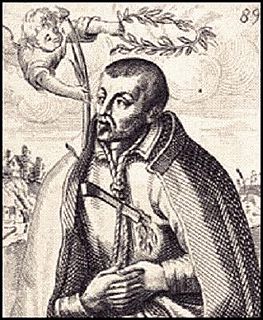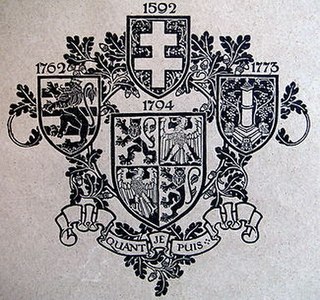Related Research Articles

Robert Southwell, also Saint Robert Southwell, was an English Roman Catholic priest of the Jesuit Order. He was also a poet, hymnodist, and clandestine missionary in Elizabethan England.
Michael Alford was an English Jesuit missionary and ecclesiastical historian. He left two major works, Britannia Illustrata, Annales Ecclesiastici et Civiles Britannorum also known as Annales Ecclesiae Britannicae.
Father Richard Holtby was an English Jesuit Superior and Roman Catholic priest.
Cæsar Clement was an English Catholic recusant.
Francis Davenport, O.M.R., also known as Father Francis of Saint Clare, was an English Catholic theologian, a Recollect friar and royal chaplain.
Maurice Clenock was a Welsh Roman Catholic priest and recusant exile. He was the first head of the English College, Rome. He was born at Llŷn or Eifionydd circa 1525 and died at sea in 1581.
Joseph Creswell was an English Jesuit controversialist.

The Colleges of St Omer, Bruges and Liège were successive expatriate institutions for the Catholic education of English students and were run by the Jesuits.
Thomas Holland was an English Jesuit priest. He is a Catholic martyr, beatified in 1929.
John Lockwood was an English Roman Catholic priest. He is a Catholic martyr, beatified in 1929.
John Martiall (Marshall) was an English Roman Catholic priest. He was one of the six companions associated with William Allen in the foundation of the English College at Douai, in 1568.
William Darrell, born 1651 in Buckinghamshire, England and died 28 February 1721 at St. Omer's College, France, was an English Jesuit theologian and writer.
Edward Coffin was an English Jesuit.

The Fatal Vespers was a disaster in Blackfriars, London, at the French ambassador's house in 1623. The floor of an upper room in the house collapsed under the weight of three hundred people who were attending a religious service, leading to nearly a hundred casualties.
John Heigham was an English Roman Catholic printer, writer, and translator. He went into exile in Douai and Saint-Omer, where he married and brought up a family. A son John, who took holy orders, left Rome for the English mission in 1649.
William Baldwin or Bawden (1563–1632), was an English Jesuit implicated in the Gunpowder plot.
Edward Catcher, was an English Jesuit, from London.
William Drury was an English dramatist.
William Drury, civilian, third son of John Drury of Rougham, Suffolk, by Elizabeth, daughter of John Goldingham of Belstead, Suffolk.
William Dickinson (1756–1822) was an English topographer and legal writer.
References
- Attribution

- Cunningham's Handbook for London (1849), i. 94
- Dodd's Church Hist. ii. 410;
- Diaries of the English College, Douay, pp. 218, 232, 234;
- Foley's Records, i. 77–97, v. 1007, vi. 235, 247, vii. 211;
- Fuller's Church Hist. (Brewer), v. 539;
- Gillow's Bibl. Dict.;
- Lowndes's Bibl. Man. (Bohn), i. 211;
- More's Hist. Missionis Anglic. Soc. Jesu, p. 451;
- Notes and Queries, 3rd ser. x. 447;
- Oliver's Jesuit Collections, p. 83;
- Pennant's Account of London (1793), p. 238;
- Thornbury's Old and New London, i. 199–204.